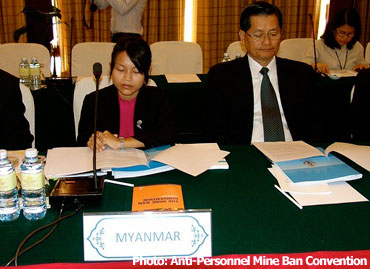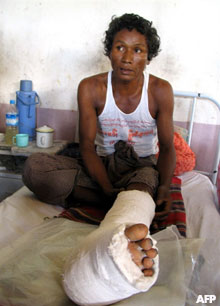Chiang Mai (Mizzima) – Burma was among one of 11 Asian countries to send a representative to a meeting on Tuesday hosted in Cambodia to address the “human costs of anti-personnel mines.”
 A statement from the Anti-Personnel Mine Ban Convention (APMBC) said other Asian nations who sent representatives to the meeting in Phnom Penh hosted by the Cambodia Mine Action and Victim Assistance Authority (CMAA) in collaboration with the United Nations Development Programme (UNDP) and the International Committee of the Red Cross (ICRC), were Cambodia, China, Indonesia, Japan, Lao PDR, Malaysia, Mongolia, the Philippines, Thailand and Vietnam.
A statement from the Anti-Personnel Mine Ban Convention (APMBC) said other Asian nations who sent representatives to the meeting in Phnom Penh hosted by the Cambodia Mine Action and Victim Assistance Authority (CMAA) in collaboration with the United Nations Development Programme (UNDP) and the International Committee of the Red Cross (ICRC), were Cambodia, China, Indonesia, Japan, Lao PDR, Malaysia, Mongolia, the Philippines, Thailand and Vietnam.
Burma’s representative was Thandar Htun Kyi from the Burmese Embassy in Phnom Penh. Mizzima was unable to reach her for comment.
The CMAA Vice President His Excellency Prak Sokhonn said that Tuesday’s meeting sought to “enhance international dialogue in the region regardless of whether States are part of the Anti-Personnel Mine Ban Convention,” APMBC reported.
Burma is not yet a signatory to the 1997 Mine Ban Treaty. Anti-personnel land mines are a severe problem in Burma with both the Burmese Army and non-state armed groups using mines heavily. Such is the scale of militarization in Burma that civilians now use land mines not only to protect their own villages but also for various types of trade such as illegal logging.
An independent scholar on Burma working for a humanitarian disarmament organization, told Mizzima, ‘Burma is a highly militarized society, especially in the areas where armed conflict is currently or has taken place. Militarization of a state occurs when the military is no longer subordinate to civilian rule. A militarized society is one in which fear is prevalent, and continually reinforced by a perpetual expectation of violence and projection of enemy images. Once the military seized power in Burma, it entrenched military values in society, including concepts such as hierarchy, obedience and non-deliberation of policies. Further, the military projected its role beyond the defense of the state to defending Burmeseness, a vague and internally non-inclusive concept.’
The ICRC estimated the total number of amputees living in Burma at 12,000 people, of whom the majority they suspect are victims of land mines. According to reports, approximately 5 million people in Burma live in townships that have areas planted with mines.
 The United Nations Resident Coordinator in Cambodia, Douglas Broderick, who attended the meeting, explained how landmines impede development: “They prevent access to farm land and slow down the construction of critical infrastructure such as schools, health centres and roads. They create fear and leave people with a feeling of insecurity many years after conflicts have ended. Those that survive a landmine accident will require medical and social welfare support for their entire lives. In summary, landmines are a burden that weighs heavily on a country’s social and economic development.”
The United Nations Resident Coordinator in Cambodia, Douglas Broderick, who attended the meeting, explained how landmines impede development: “They prevent access to farm land and slow down the construction of critical infrastructure such as schools, health centres and roads. They create fear and leave people with a feeling of insecurity many years after conflicts have ended. Those that survive a landmine accident will require medical and social welfare support for their entire lives. In summary, landmines are a burden that weighs heavily on a country’s social and economic development.”
Nobel Peace Prize laureate Aung San Suu Kyi gave a statement to the International Campaign to Ban Landmines (ICBL) on February 28 this year, in which she said: “The banning of the use of destructive weapons, negatively effecting non-combat civilians, must be undertaken by the Tatmadaw (Burmese Army), as well as the other armed groups. The act of using landmines is not in accordance with a soldier’s conduct toward the state and its citizens…. If landmines continue to be used, and humanitarian sentiments not mobilized, our nation will not be peaceful.”
The meeting was a precursor event in the run up to the “Eleventh Meeting of the States Parties” (11MSP) to the Anti-Personnel Mine Ban Convention (or Ottawa Convention) which will be held in Cambodia from November 27 to December 2 this year.
The 11MSP will be a formal, diplomatic meeting of the 156 states that have accepted the Convention, the APMBC statement said.
“They include most of the States that at one time used, stockpiled, produced or transferred anti-personnel mines and the vast majority of States that are or have been affected by anti-personnel mines. Several States that are not part of the Convention are expected to attend as Observers,” said the statement.
Cambodia is one of the most mine-affected countries in the world, and the devastation wreaked in the country by land mines triggered the international movement to ban anti-personnel land mines.
In November 2010, Agence France-Presse reported that Burma is now the only government still laying landmines after Russia stopped using such weapons.
The International Campaign to Ban Landmines (ICBL) credited the 1997 Ottawa international treaty banning anti-personnel mines for the reduction in usage.
“Although no additional countries joined the Mine Ban Treaty in 2009 or the first half of 2010, the power of the international standard rejecting the weapon continued to be evident,” said the group in its annual Landmine Monitor.
“Only one government – Myanmar [Burma] – newly laid antipersonnel mines, no state transfers of mines were recorded, and as few as three states were actively producing mines,” it said.



